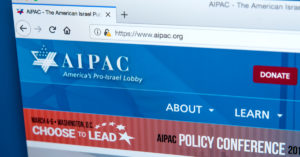Muslims need to wake up to Israel’s plans for territorial expansion and urgently put in measures to stop it.
After decades of wars, civil strife and uprisings, the Middle East is arriving at arguably the most dangerous inflection point in its recent history.
In typical disdain for international law, Israeli forces have raided the Sheikh Jarrah neighbourhood of occupied East Jerusalem and stormed the Al-Aqsa compound in the space of a week, sparking international Muslim outrage during the month of Ramadan and compromising the already fragile security of the region.
But to understand what is at stake in this current episode of Israeli aggression, it is important to place Israel’s latest incursion on Palestinian territory in its ideological context.
Greater Israel
When discussing the current crisis the majority of news outlets have omitted any discussion on the key role played by a central tenet of settler ideology in the ongoing aggression.
According to the majority of Israeli settlers, there is an intransigent belief in the concept of Greater Israel, according to which the borders of Israel as stipulated in the Bible stretch from the River Nile to the Euphrates, all of which is the historic birthright of the Jewish people.
Subscribe to our newsletter and stay updated on the latest news and updates from around the Muslim world!
These settlers believe that Jews are tasked with restoring all the territories contained within this geographic area – including Palestine, Southern Lebanon, Jordan, Golan Heights and portions of Egypt, Iraq, Syria and Saudi Arabia – and live with the conviction that doing so will herald the arrival of a Davidic King who will proclaim divinity from the Temple Mount in Jerusalem to grant redemption to the Children of Israel. Hence, the proprietary interest in what has been described as the most contested piece of real estate in the world.
For many settlers, restoring the land which was assigned to Israel’s patriarchs in the Book of Genesis is a non-negotiable and central plank of Zionist policy. The sanctity of the Holy Land can only be actualised once this doctrine begins to directly impact geopolitical events.
But it would be wrong to assume that such a doctrine is endorsed only by fringe Zionist extremists in the secular Likud party or a niche eschatological cult with a marginal following. The truth is, among a significant portion of orthodox and right wing nationalist Jews, there is a messianic fervour underpinning the illegal and brutal occupation of Palestinian territory, where establishing “facts on the ground” by aspiring to the maximal territories delineated in scripture enhances Israel’s national security and moves the nation a step closer to fulfilling its divine mandate.
Yinon Plan
The clearest articulation of this settler Zionist strategy in the Middle East is perhaps contained in a document authored by Oded Yinon, which featured in a quarterly Hebrew periodical in 1982.
Commonly referred to as the Yinon Plan, the former official of the Israeli Foreign Ministry outlined two essential conditions to guarantee Israel’s long-term survival.
The first was for Israel to embark on a shrewd policy to become the dominant hegemonic power in the region, and the second was to effectuate a policy of “balkanisation” of its neighbouring territories along ethnic and sectarian lines. Once the dissolution of Arab states is complete, they would eventually become Israeli satellites and the Zionist state’s source of moral legitimation.
In my view the Yinon Plan has been a cornerstone of the Zionist agenda for the Arab world. Besides an aggressive assertion of sovereignty it aims to prevent the emergence and mobilisation of any grassroots mass movement on Arab soil which may potentially thwart Zionist designs for the region.
Two state deception
But it is short-sighted to think of the publication of the Yinon Plan as the impetus for Israeli expansionism. Israel’s ambition for power through territorial expansion predates any outline of such an aspiration in the Yinon Plan. In fact, ever since the international community became receptive to the idea of “Israeli sovereignty,” the political and human rights implications of striving for the integrity of the Jewish homeland were ominous.
The rejection of the Peel Commission’s proposed partition plan by the Zionist Congress in 1937 on the basis that it apportioned an insignificant amount of land to Jewish settlers was a menacing indication of the future trajectory of Israeli diplomacy. In fact, the first Israeli PM David Ben-Gurion made no secret of his penchant for defying the wishes of the indigenous “Gentile” inhabitants of the land. At the heart of his operational strategy for the new Israeli epoch was the formal renunciation of static borders and a declaration that any acceptance of a partition would be conditioned on the compulsory population transfer of Palestinians.

Furthermore, he categorically stated that such negotiations would be a Trojan horse for securing unlimited Jewish migration to the Promised Land in future generations, commonly known in settler circles as “aliyah.” By his own admission, the sadness felt at losing “Judea and Samaria” following the UN vote to partition Palestine into two states in 1947 was always going to be short lived, since neither the borders nor international agreements would remain fixed.
But the early architects of Israeli statehood were not alone in successfully crusading for their prophesied homeland. It is impossible to unpack the overwhelming political traction generated for their cause without factoring the overarching significance of another dangerous and complex phenomenon which is equally committed to the pursuit of Greater Israel: Christian Zionism.
Christian Zionism
No political force has so aggressively championed the supremacy of the Jewish homeland more than Christian Zionism.
The origins of this peculiar interfaith union lie in an interpretation of the Bible which emerged in 19th century England called dispensationalism, according to which the return of Jews to Palestine marks a pre-ordained process that will lead to a series of apocalyptic events. These include the Great Tribulation where Christians are raptured to heaven and the emergence of the Antichrist, which will eventually culminate in the Second Coming of Christ, who will commence a millennium of earthly rule centred on Jerusalem.
The political momentum to facilitate the movement of Jews to the promised land gained pace in Victorian England, largely due to the advocacy of eminent philanthropists like Lord Shaftesbury and leading figures in English Evangelical circles who vigorously campaigned for the restoration of Jews to Palestine by lobbying the British cabinet on foreign policy decisions.
Not only was this period instrumental in transforming Christian-Jewish relations, it also changed the course of world history by creating a climate of opinion in the United Kingdom in favour of the Balfour Declaration of 1917, which pledged British support for a Jewish homeland in Palestine.
By the time the League of Nations entrusted Great Britain with the mandate for Palestine in 1922, the Christian proponents of Jewish sovereignty in the Holy Land were embedded in the British ruling class, with some of England’s leading political figures lending their full weight behind the Zionist movement founded by Theodre Herzl in 1897. In fact, British imperialists were canvassing public opinion in favour of a Jewish return to Israel for over a century before the formal birth of predominantly secular Zionism.
American Evangelism
Today, this dispensationalist view of history is shared by a core American constituency consisting of a faith-based right-wing movement dubbed the New Christian Right who are bent on resurrecting what they deem to be the unadulterated liturgical meaning of the Promised Land.
Ever since secular cultural trends took root on American soil from the second half of the 20th century, the Christian Right slowly abandoned their long tradition of quietism by naturally aligning their interests with the Republican Party, given its traditionally conservative stance on topics like abortion, homosexuality, pornography and marriage.
After accepting to join forces with Republican politicians with a view to mobilising key constituencies to a conservative social agenda underpinned by religious values, their increased participation in politics eventually saw them grow into an indispensable political force and the most reliable constituency of the GOP.
This period also coincided with an expedient alliance between predominantly Evangelical Christians and America’s Jewish Zionists, particularly in the aftermath of the Six Day War in 1967, which saw Israel inflict a humiliating defeat against an Arab coalition. Not only did the outcome of this conflict influence the Johnson administration’s decision to enlist Israel as a strategic bulwark against the combined threat from the Soviet Union and Pan-Arabism, it also marked a portentous fulfilment of prophecy for the Christian Right who were committed more than ever before to the territorial preservation and expansion of the state of Israel.

Although not every evangelical adopts an uncritically pro-Israel position, the majority interpret developments on the ground through the grid of prophesy. As a result, every action of the Israeli settlers is idealised as they are pitted against a Palestinian people who are God’s adversaries according to the salvation history called dispensationalism.
It is interesting to observe that despite clashing on a number of issues ranging from culture wars to specific theological tenets, the Christian Right have achieved an exceptional degree of interfaith unity with Jewish Americans, through a mutually unwavering commitment to securing Jewish possession of the covenanted land.
Ever since The American Israeli Public Affairs Committee (AIPAC) – a major lobbying group advocating pro-Israeli policies – realigned itself with Christian conservatives in the 1980s, Christian Zionists have been among the most vociferous critics of the Boycott, Divestment and Sanctions movement and today they are unconditional partisans for Israeli statehood at government level.
For decades, this alliance has functioned as an incredibly powerful force directing the course of American foreign policy vis-à-vis Israel for successive U.S. administrations, so much so that there exists a bipartisan consensus on the question of Israel’s right to exercise sovereignty over the Palestinian people.
Future expansion
Not only is the aforementioned context key to understanding the machinations at work behind Israel’s latest act of cowardly aggression against a defenceless Palestinian population, it naturally begs the question: Does Israel stop here? The simple answer is no.
To fulfil the Greater Israel prophecy, PM Netanyahu will embark on arguably his most dangerous war footing with Palestinians to date and set about reconfiguring the geopolitical environment of not only neighbouring Arab territories but also countries which Israel deems an existential threat to its hegemonic designs, with the full diplomatic and military support of the U.S.

After the unilateral annexation of sections of the West Bank and Jordan Valley, I anticipate that the next stage of this dastardly plan will involve incursions into mainland Syria, Lebanon and Egypt and a strategy to destabilise both Iran as well as Pakistan due to their possession of nuclear weapons.
Both KSA and UAE have calculated that any significant break with Netanyahu means imperilling the security of their kingdoms. Therefore, they will enthusiastically champion initiatives to rehabilitate Israel by conditioning their populations to accept a new policy framework which commits Arab nations to the cause of Israeli security and expansion.
The Muslim world is on the edge of a precipice. Our only solution to this impending doom is obstructing Israel’s ambition to become the central nation in the millennial kingdom. This can only be achieved by working earnestly to revive the God-ordained Khilafah, which can organise our collective temporal affairs and serve as a bulwark against the aggressive posturing of predatory nations.


















